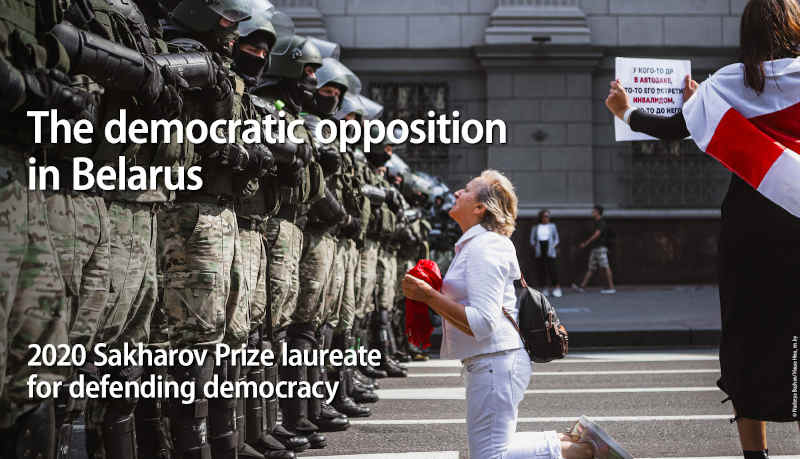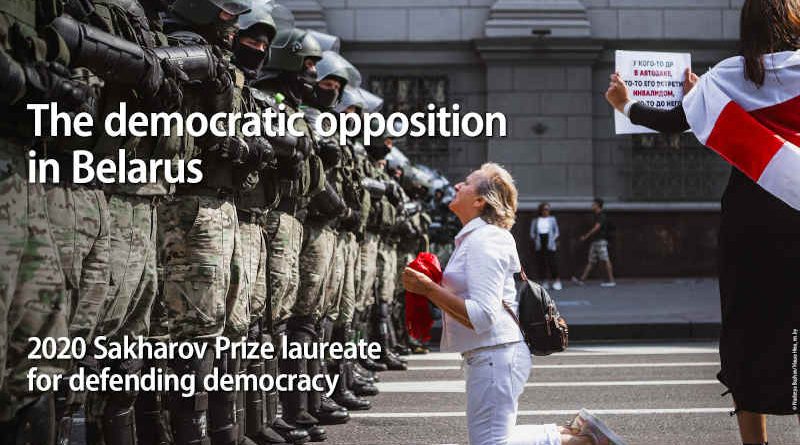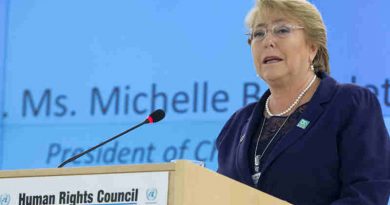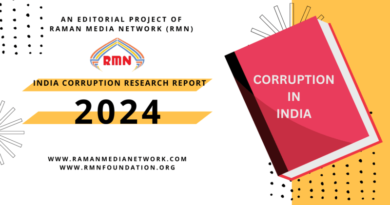Belarusian Leader Urges Europe to Support Democratic Voices

The traditional U.S. and European leaders as well as the UN bureaucrats have completely failed to stop human rights violations in an increasing number of autocratic countries.
By RMN News Service
In an address to the Member of European Parliament (MEPs) on November 24, the leader of the Belarusian democratic forces, Sviatlana Tsikhanouskaya, urged Europe to amplify the Belarusian peoples’ voice.
In his opening remarks, EP President David Sassoli said: “Sviatlana is a symbol of the struggle for democracy and freedom, and a voice for many political prisoners currently incarcerated in Belarus. The regime did not hesitate to use men, women, and children who were in need of protection for the sole purpose of destabilising the EU. This Parliament calls on the other institutions to stand up for the defence of fundamental rights.”
In her speech, Ms Tsikhanouskaya began by looking back at the Belarusian regime’s appalling crackdown on demonstrators and dissenting voices following the fraudulent presidential elections in August last year.
She talked about all those who have been imprisoned, targeted or even killed by Belarusian security forces, such as human rights activist Ales Bialiatski, blogger Raman Pratasevich, political activist Maria Kalesnikava, art teacher Raman Bandarenka, journalists Daria Tchultsova and Katsiaryna Andreeva, Olympic athlete Krystsina Tsimanouskaya and many more, while also addressing the latest crisis involving migrants on the EU-Belarus borders.
When doing so, she posed a stark question to MEPs: “Supposing this abuse of migrants is somehow stopped, do you really assume the regime’s abuses and threats beyond its borders will end there?” she asked, warning of an increase in smuggled drugs and other contraband, military provocations and even nuclear disasters on the EU’s external borders.
Sviatlana Tsikhanouskaya also stressed how the Belarusian democratic movement cannot afford to wait for Europe much longer, that European expressions of solidarity and concern must now be transformed into concrete action and that Europe needs to become more proactive when facing autocracy.
On European sanctions, she said: “Let me assure you, sanctions do work. Continue holding a consistent sanctions policy. Sanctions split the elites, destroy corruption schemes and divide people around Lukashenka,” she underlined.
|
Increasing Authoritarianism and Futile Sanctions The imposition of sanctions is a weak punishment, which is ignored by the authoritarian nations. In the past, countries such as Belarus, Myanmar, Cuba, Nicaragua, Paraguay, China, Russia, and North Korea have been sanctioned, but authoritarianism, corruption, and human rights violations have only increased in these countries. The traditional U.S. and European leaders as well as the UN bureaucrats have completely failed to stop human rights violations in an increasing number of autocratic countries. It is also being observed that the peaceful agitations of persecuted citizens in authoritarian countries such as Thailand, Myanmar, Belarus, Russia, Israel, India, Hong Kong, and Brazil could not protect people’s fundamental rights. Dictatorship is becoming a new normal even in the so-called democratic nations. Therefore, a new globalized system of governance is required to protect ordinary citizens and their rights in different countries. ~ By Rakesh Raman |
Ms Tsikhanouskaya also pleaded for Europe and the Belarusian democratic forces to stand more united in solidarity. “Let’s not forget the Belarusian prisoners of conscience and let’s help those who were forced to leave the country. Today, not only democracy in Belarus but also democracy in Europe depends on whether we will walk this path together,” she concluded.
MEPs also held a separate plenary debate with Slovenian Foreign Affairs Minister Anže Logar, representing the Council Presidency, and European Commission Vice-President Margaritis Schinas, on the security and humanitarian consequences of the situation in Belarus and at the country’s border with the EU.






